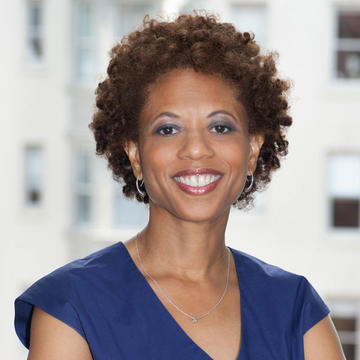A culture for American democracy
Melody Barnes asks: Is it possible for the majority of Americans to cross the chasm that separates us?
Read the entire article in Democracy: A Journal of Ideas
Two days before the election, a Trump car caravan collided with Biden supporters and social justice advocates in front of the now graffiti-covered statue of Robert E. Lee in Richmond, Virginia. Protesters have stationed themselves around the statue since the murder of George Floyd. A pro-Trump candidate for Richmond’s city council organized the convoy, according to local media. Trump flags became targets, a demonstrator said he barely avoided being hit by a car, insults were exchanged, and gun shots were reported. The raw emotion of American politics and culture were in full view, requiring us to ask: Do we have enough in common to build a multicultural democracy?
On November 3, we elected a new president, and we also got a snapshot of the American body politic and our culture. Fewer than 6 million votes separate the winner from the loser, and citizens of the same country seem to live on different planets.
While unimaginable to many Americans, more than 73 million voters support a president who champions an immigration policy that ruthlessly separated children from their parents. It would be easier for me to retrieve my jacket at a Trump hotel coat check than it will be for 600 or so children to be reunited with their mothers or fathers; that is, easier for me to fetch a mundane item than for children to find their parents. And since March, COVID-19 has crisscrossed the United States leaving nearly a quarter million Americans dead and more than 10 million infected. But instead of drawing us closer as we fight a common enemy, COVID-19 has revealed the depths of the divide in American culture. The virus is a hoax or the virus is life threatening. Masks are evidence of concern for others or a sign of weakness and a threat to liberty. And when the White House itself became a hotspot, the band played on as the president’s supporters cheered at packed, Hatch-Act violating campaign rallies.
Culture sets the table for our politics, and has a symbiotic relationship with democracy’s norms and institutions.
Is it possible for the majority of Americans to cross the chasm that separates us, and what would it take to do so?
In business it’s often said that “culture eats strategy for breakfast.” Similarly, culture sets the table for our politics, and has a symbiotic relationship with democracy’s norms and institutions. Culture shapes our actions, habits, character, and destiny. It determines how we make decisions and respond to challenges. It becomes a powerful belief system embedded in daily life and it even fuels our democracy.
American culture will never animate a universal kumbaya moment, nor is that democracy’s aim. Democracy allows us to do the hard work of organizing citizens with different backgrounds, opinions, and goals, anticipating that unrestrained self-interest will be tempered by the benefits of a society of institutions, the rule of law, as well as tolerance and pluralism. Yet history tells us that our Constitution and laws—even as they have expanded freedom and become more democratic—are not enough. Our foundational document and laws are only as good as our culture, and culture requires community. Community isn’t just about geography, but a commitment to the common good and to achieving our democratic aspirations and, when we’ve failed to live up to them, to redress inequities.
